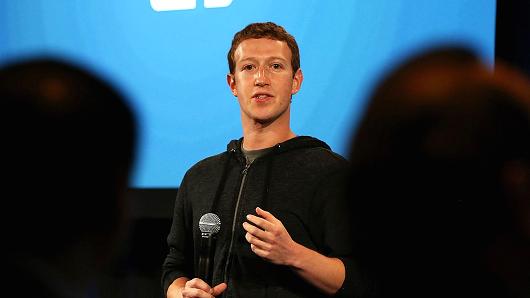Facebook CFO David Wehner spooked Wall Street on Wednesday’s post-earnings conference call by reiterating a warning that ad revenue growth would slow in 2017, and that next year will be a year of heavy investment for the company.
The stock closed down almost 6 percent, just under $120 per share on Thursday.
Plenty of analysts were unfazed by the drop, however.
“We would take advantage of any dislocation in shares, acknowledging Facebook may trade sideways until the company provides additional details around its 2017 expense guidance, which is most likely during fourth quarter 2016 earnings,” wrote JMP Securities analyst Ron Josey.
The company has a number of giant opportunities ahead, and investing in things like video, messaging and virtual reality is the correct path, wrote Mizuho Securities analyst Neil Doshi in a note to investors on Wednesday.
Facebook now has 1.79 billion monthly active users and 4 million advertisers, according to the latest earnings report. The company beat analyst expectations on both revenue and earnings per share.
The problem is that Facebook’s news feed is nearly saturated with ads, so the social network will be unable to continue to increase the number of ad impressions people see at the same rate as it has over the past several years, Wehner has said.
To keep its ad revenue growing — albeit at a slower rate — Facebook intends to increase its user base, keep people in its apps and focus on premium ads, executives said on the post-earnings conference call.
Going forward, there will be a heavy focus on video to draw in TV advertisers, so it can charge marketers more money for placement in the Facebook News Feed and on Instagram. The social network is also working on monetizing its family of apps including Messenger and WhatsApp.
Analysts who take a long-term view of Facebook’s business have praised the plans, saying the company is doing what it needs to do to keep users engaged and give advertisers the incentive to spend more money on its flagship Facebook app and on Instagram.
“Management plans reduced ad load growth rates ahead in order to preserve the user experience, but we expect user growth and advertiser demand around new ad products to offset the impact to revenues, while margins will likely continue to expand,” wrote Wedbush analyst Michael Pachter in a note to investors on Thursday.
CEO Mark Zuckerberg said the company will make big investments next year, which analysts said was another factor putting pressure on the stock. These investments are crucial for the company to execute on its 10-year plan, said analysts.
“We already took into account the expected change in ad load growth in our projections, and based on our view that Facebook’s multiple opportunities across its 10-year strategic plan likely require significant investment, we believe increasing investments is the right thing to do,” JPM’s Josey said.
Mizuho’s Doshi noted that Facebook has historically provided broad operating expenditure guidance and consistently outperformed its own guidance.
“Facebook can afford to give up some margin in order to take share from other social and online advertising platforms,” wrote Doshi.
Facebook shares closed down 10.15 percent from its 52-week high of 133.50 from October 25, and hit “correction” levels.






